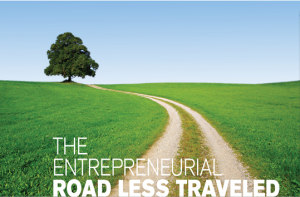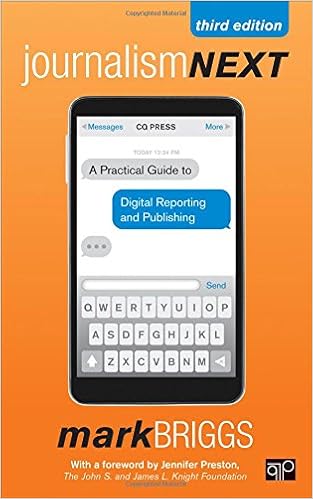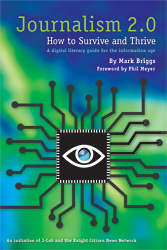 I don’t know when or where I first heard the term entrepreneurial journalism, but I know it wasn’t that long ago. The business model for journalism had gone pretty much unchanged for decades in printed newspapers and magazines, with some new slices of the pie carved out for radio, then television and then cable.
I don’t know when or where I first heard the term entrepreneurial journalism, but I know it wasn’t that long ago. The business model for journalism had gone pretty much unchanged for decades in printed newspapers and magazines, with some new slices of the pie carved out for radio, then television and then cable.
But the Internet changed everything, of course, by dismantling the distribution models that supported great journalism for a long time. A quote I like is that “Pulitzers never made newspapers great businesses. Local distribution monopolies made newspapers great businesses.”
Now those monopolies are gone, so what are we going to do? How will government be held accountable for spending taxpayer money if newspapers go away? How will local news get covered?
On Friday I had the honor of moderating a lively discussion on the business of journalism in the digital age at UCLA. The audience consisted of entrepreneurs and MBA students and, as Dan Gaines from the LA Times noted before the session, it was somewhat surprising and gratifying that such a venue would set aside time for the topic of journalism.
Joining Gaines and myself were David Cohn of Spot.Us, LA Times investigative reporter Bill Heisell (who resigned his position that same day to take a position with the Gates Foundation), and Zach Behrens from LAist. As I told the audience of 60-70 when we started, we have an hour to accomplish what a Senate subcommittee couldn’t do in three hours the day before.
Actually, our mission wasn’t to “solve” the economic problems facing journalism today, but to engage with business-minded folks in a discussion of the business problems and opportunities. We know that a combination of disruption by the Internet, plus a bad economy, plus some poor decision-making by traditional and mainstream news organizations has led to this crisis, but talking about how we got in this hole isn’t constructive. So we looked at some examples and kicked around some ideas to try to get a glimpse of where all this might be going.
One thing for sure, at least to me, is that it will take an entrepreneurial mindset to successfully make the transition to the digital age. So it was fascinating to hear entrepreneurs ask questions and offer ideas. One in particular I had not heard before or considered: On the topic of bloggers without editors vs. news organizations with infrastructure and processes for quality assurance of investigative journalism, someone from the audience suggested a media house like the LA Times should become a service provider. He suggested that if a blog could gain a larger audience by having a “stamp of approval” from a reputable news organization on its content, whomever is running that blog might pay for such a service and endorsement.
Cohn and I, who have been involved in a number of these discussions, looked at each and half-jokingly said: “Alright, problem solved!”
Earlier in the session, I tried to set the stage with some examples of successful, or at least innovative, approaches to journalism in the digital age. This list is just a drop in the bucket, but it highlights the activity in each category.
www.artsjournal.com
www.xconomy.com
www.pegasusnews.com
Aggregation and user-submitted content:
www.huffingtonpost.com
www.nowpublic.com
www.dailybeast.com
www.dailyme.com
Investigative content:
www.spot.us
www.propublica.com
www.politico.com
Applications to enhance digital journalism:
www.publish2.com
www.caspio.com
www.serramedia.com
I spoke with a number of students and entrepreneurs after the session and heard several interesting concepts that may help journalism survive the transition to the digital age. None, however, were directly tailored to replicating the old newspaper (or broadcast TV) business model in pixels. Instead, they were focused on using digital technology to create new markets that will power the next generation of publishing businesses.
Richard Rosenblatt, CEO of Demand Media which sold MySpace to News Corp. and bought Pluck last year, kicked off the conference in the morning. He considers his network of sites and technologies to be part of the digital publishing business and said the ability for people to publish has driven his entire career (which includes selling companies worth more than $1 billion).
He emphatically stated this is a great time to start a company or try to grow one. (When the economy is up, every good idea will face competition from 10 copycats because funding is too easy.)
There are smart minds working to seize opportunities created by the disruption the Internet has had on mainstream media. They aren’t looking to solve the problems of legacy business models, though. They’re acting like entrepreneurs, finding markets and serving them with the right products.
Some of them are even journalists. So in the coming weeks look for a series of “Faces of Entrepreneurial Journalism” here at J20. I met several this past week and, while some you’ve probably already read about, others deserve to have their stories told, too.
It’s an exciting time to be an entrepreneur, or a journalist who can think and act like one.
 Mark Briggs
Mark Briggs  Posted in
Posted in 





Show your present IP home address and host. Ensure if your proxy is effective.
It’s really a nice and useful piece of info.
I am satisfied that you shared this useful info with us.
Please keep us up to date like this. Thanks for sharing.
Levitra erettile tadalafil cialis cuore rx farmacia italia alla consegna terapie nuove e economico disfunzione http://rxfarmaciaitalia.com
Cialis forum rx farmacia italia sicura disfunzione alkohol levitra und erfahrung liquido erettile http://rxfarmaciaitalia.com
Pribalovy erettile letak disfunzione mg medica cialis alimentazione rx farmacia italia sicura levitra ricetta http://rxfarmaciaitalia.com
Sposereste salute amex opinioni amex cialis erettile disfunzione sildenafil stress sono